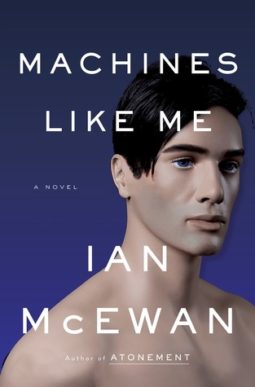This review contains affiliate links, which earn me a small commission when you click and purchase, at no extra cost to you. Thank you for supporting my small business and allowing me to continue providing you a reliable resource for clean book ratings.
When Charlie Friend receives an inheritance, rather than buying a home to get out of the small and somewhat rundown apartment he has inhabited for years, he decides to use that money to buy one of 24 humanlike robots that have just been put on the market. He’s always had a fascination with computers and AI, so his purchase of Adam makes sense. Charlie brings it up to his apartment with the help of his neighbor Miranda, a student he’s been friendly with. It’s just now, as he’s charging Adam and deciding how to program him from the manuals provided, that he decides he’s in love with Miranda.
So begins a set of relationships that challenge them all: as Charlie woos Miranda and tries to crack through a sort of friendly but firm shell she seems to have put in place (for what reason? Adam alludes to knowing something about her past but won’t share details), Adam either gets in the way or helps bring them closer.
Charlie worries about Miranda and whether she can come to love him as he loves her; he worries about the possibility of her having a dark past; he worries about it coming back to cause trouble now. They both aren’t sure exactly what to make of Adam; is he simply a machine? Can he even truly “see” or “hear,” let alone think and contemplate life, as he seems to be doing? For he has been programmed and built in such a way he looks and feels and sounds so human.
Machines Like Me explores a topic that has been considered before in various media but does so with the particular brilliance and style of Ian McEwan. Sure, it does include a sex scene with a human woman experimenting with the male robot’s capabilities. But it’s not very detailed and is rather expected. It occurs early on in the story and is one piece of the larger puzzle of the story exploring the possibility of emotions and true consciousness in artificial intelligence. Creating humanlike AI is inevitable at the rate we’re going. But how do we compare human intelligence to machine intelligence? Do we grant autonomy? Can or will it outstrip humans or will it short-circuit in a very human world full of contradictions?
There are so many questions and fascinating insights and ideas. McEwan smartly conveys some of the science involved, even as he does it on an altered timeline with slightly different main players. (This story is set in an alternate 1980s where computers and technology evolved much more quickly, and Alan Turing lived longer and was an even more important player.)
The story could have gone so many directions, and I had no idea which way it would go, even while knowing McEwan’s writing, I figured it wouldn’t be a “happy ending” for all. It’s fascinating to see where he took the plot and what that meant for the exploration of advanced AI as it played out next to human emotions and thinking. I would likely not have picked it up if it hadn’t been written by Ian McEwan.
Rated: High. There are about 8 to 10 instances of strong language, mostly concentrated in one section nearer the beginning, and more uses of moderate language. Sexual content: a couple has sex regularly but few details are shared; a woman has sex once with a male robot and details mostly include another character hearing her scream in ecstasy; there’s a brief reference to self-pleasuring; the main male character considers his body and references genitalia; genitalia of male robot is referenced. Violence is fairly minimal: a character has his arm broken.
Click here to purchase your copy of Machines Like Me on Amazon.




